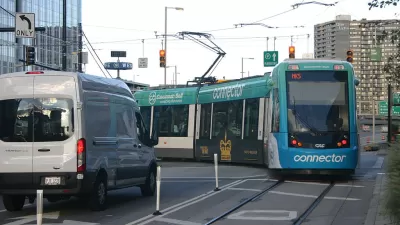The cancellation of Cincinnati's under-construction streetcar became a real possibility this month with the election of Mayor John Cranley. Could property owners and businesses who expected a boost from its arrival sue if it's cancelled?
Although "developers are already lining up" along Cincinnati's new 3.6-mile streetcar route and a recent report from the project's executive director estimates that it would cost nearly as much to cancel the project as to complete it, the chances that new Mayor John Cranley proceeds with promises to kill the project appear to be strong.
Chris Wetterich looks at the legal case for whether "property and business owners along the streetcar route could sue and win a case against the city."
"It will be difficult for those property owners to make their case," he explains, "but there’s legal concepts they can use to try to make their claim. Those property owners' case rests within the confines of two common law concepts: 'Reliance-based claims' and 'third party beneficiary claims.'"
"In court, the key will be whether downtown and Over-the-Rhine property owners were intended to be the direct beneficiaries of the streetcar or whether the benefits they would receive simply were incidental."
What other "calamities" could the city face if it chooses to cancel the streetcar? Wetterich looks at 10.
FULL STORY: If property owners and businesses sue over the streetcar, do they have a case?

Planetizen Federal Action Tracker
A weekly monitor of how Trump’s orders and actions are impacting planners and planning in America.

Maui's Vacation Rental Debate Turns Ugly
Verbal attacks, misinformation campaigns and fistfights plague a high-stakes debate to convert thousands of vacation rentals into long-term housing.

Restaurant Patios Were a Pandemic Win — Why Were They so Hard to Keep?
Social distancing requirements and changes in travel patterns prompted cities to pilot new uses for street and sidewalk space. Then it got complicated.

In California Battle of Housing vs. Environment, Housing Just Won
A new state law significantly limits the power of CEQA, an environmental review law that served as a powerful tool for blocking new development.

Boulder Eliminates Parking Minimums Citywide
Officials estimate the cost of building a single underground parking space at up to $100,000.

Orange County, Florida Adopts Largest US “Sprawl Repair” Code
The ‘Orange Code’ seeks to rectify decades of sprawl-inducing, car-oriented development.
Urban Design for Planners 1: Software Tools
This six-course series explores essential urban design concepts using open source software and equips planners with the tools they need to participate fully in the urban design process.
Planning for Universal Design
Learn the tools for implementing Universal Design in planning regulations.
Heyer Gruel & Associates PA
JM Goldson LLC
Custer County Colorado
City of Camden Redevelopment Agency
City of Astoria
Transportation Research & Education Center (TREC) at Portland State University
Jefferson Parish Government
Camden Redevelopment Agency
City of Claremont



























